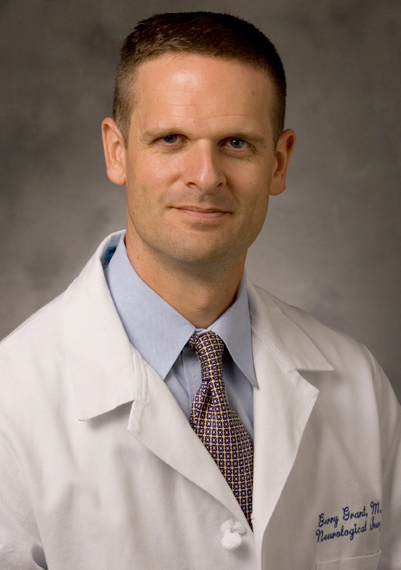
Grant Lab Team Members
 |
Gerald Grant, MD Associate Professor, Med Center Line, Neurosurgery Department Associate Professor Division Chief, Pediatric Neurosurgery |
Dr. Gerald Grant, MD, Associate Professor of Neurosurgery and, by courtesy, of Neurology at Stanford University, joined Stanford and CCBT in 2013 from Duke University. At Duke, Dr. Grant served as Director of the Pediatric Brain Tumor Center and Pediatric Epilepsy at Duke and was the Co-Principal Investigator of the PBTC (see above) for the Duke site. Dr. Grant holds several executive positions in national organizations which include the Congress of Neurological Surgeons, American Association of Pediatric Neurosurgeons, the Section of Pediatric Neurosurgery, and the National Committee on Trauma in the American College of Surgeons. He is on the editorial board for Neurosurgery and Surgical Neurology International. He is also on the Board of Directors for the Pediatric Brain Tumor Foundation and Teen Cancer America.
Dr. Grant received his B.S. degree in Neurosciences and German from Duke and his MD from Stanford University. He also served active duty with the US Air Force and was deployed to Iraq in support of Operation Iraqi Freedom. As of September 1 2014, Dr. Grant is the new Division Chief of Pediatric Neurosurgery at Stanford. He is a member of the Stanford Cancer Institute, the Child Health Research Institute and Bio-X.
Dr. Grant directs a Blood-brain Barrier Translational Laboratory funded by the NIH/NINDS focusing on enhancing drug delivery to brain tumors in children. He is also a national expert on language mapping of the brain in children with brain tumors or intractable epilepsy. He is currently co-Principal Investigator on a Phase I/II clinical trial funded by the Department of Defense pioneering a dendritic cell based vaccine for children and young adults with recurrent medulloblastoma. Dr. Grant is also closely involved in a national clinical trial along with Dr. Fisher, Partap, and Monje, focusing on children with Diffuse Intrinsic Pontine Glioma.
Research associates
Christy Wilson, PhDChristy received her PhD in Biomedical Engineering from the University of Tennessee where she studied the role of inflammation in the early response to radiation in the brain. Her thesis work utilized a cranial window model that allows for the in vivo visualization of the vascular network of the rodent brain. She completed her post-doc at Duke University with Dr Grant in the Department of Neurosurgery focusing on the blood-tumor barrier and methods to modulate the barrier, utilizing the cranial window model to visualize tumor growth and vasculature changes, in vivo. She joined Stanford University in August of 2013 as a research associate and continues to work on in vivo models of tumor development and the changes in the microenvironment induced by tumor presence.
LSRAs
Jenny Pokorny
Jenny Pokorny received her bachelor’s degree in Cellular and Molecular Biology from Beloit College. She started out her lab career at the Mayo Clinic in Rochester, MN where she worked in the Neuroimmunology Lab performing clinical assays then transitioned to Radiation Oncology research with Dr. Jann Sarkaria. As a member of the Sarkaria lab, she focused on characterizing the responses of patient derived xenografts to various novel chemotherapeutics and attempting to understand the molecular basis for response or resistance. In the Grant Lab, Jenny is hoping to use her current in vitro and in vivo knowledge to continue to further our basic understanding of glioblastoma.
Darren Jindal
Darren recently completed his bachelor’s degree in Bioengineering here at Stanford, with honors, characterizing the internalization of a protein engineered to simultaneously bind and inhibit VEGFR2 and αvβ3 Integrin. He has worked on staining anti-cancer agent relevant angiogenic markers, assessing expression level and distribution in human tumor xenografts and patient tissue. He has dabbled in developing user-friendly, semi-automated routines in MATLAB to introduce efficiency and reproducibility into routine microscopy image analyses such as colocalization, internalization, and fitness comparisons. Darren looks forward to shifting focus to the blood-brain barrier and continuing to characterize novel anti-cancer agents within this context.
collaborators
Ben Barres (Neurobiology)
A.C. Matin (Immunology and Microbiology)
David Camarillo (Biomedical Engineering)
Jennifer Cochran (Biomedical Engineering)
Fan Yang (Biomedical Engineering and Orthopedics)
Michelle Monje (Neurology)
Sam Cheshier (Neurosurgery)
